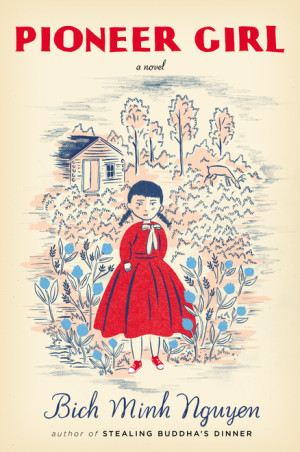8Asians is participating in the Smithsonian Asian Pacific American Center’s Book Dragon Book Club. Posts on 8Asians will be cross-posted on their website where you can also check out other reviews and author interviews. This month’s book is Pioneer Girl, by Bich Minh Nguyen.
 There’s a point in Pioneer Girl: A Novel when its heroine, Lee Lien, a recent PhD in literature stuck living at home with her mother and grandfather while she works in the family restaurant, realizes something about the literary mystery she’s been trying to solve.
There’s a point in Pioneer Girl: A Novel when its heroine, Lee Lien, a recent PhD in literature stuck living at home with her mother and grandfather while she works in the family restaurant, realizes something about the literary mystery she’s been trying to solve.
Is her mother’s gold pin, left behind by an elderly American woman journalist in the early 1960s in her grandfather’s café in Vietnam, actually an heirloom that had belonged to Laura Ingalls Wilder, author of the Little House on the Prairie books? Was that journalist in fact Rose Wilder Lane, Laura’s daughter? What is this pin worth, and what will Lee do with it next?
The story of the pin that Lee has constructed, from her grandfather’s stories, her own research, and a stolen paper or two, is fantastic and almost too good to be true. But it is not really hers to share. Sure, she has driven from Illinois to Iowa to Missouri, and flown out to San Francisco for what she assumes will be a happy ending to the story of the pin. But the pin doesn’t solve the problems she has with her family, notably her reticent mother and her estranged brother, Sam.
Back in Illinois, Lee’s ma waits for her daughter to come to her senses, to settle down, and take her place behind the register at the family restaurant. She had raised Lee to live a more stable life, which doesn’t involve driving all over the Midwest engaged in research. But ma‘s own life in America, which was largely spent moving from one small town to the next, seeking work in a stream of Chinese buffets before she can find and finance her own business, is the precursor to Lee’s own journey. Ma isn’t enjoying the kind of success she might have envisioned when she and her father, Lee’s kind grandfather, escaped Vietnam for a new life in America. She wonders why neither Lee not her estranged brother Sam can understand the allure of the restaurant she struggled to open, waiting for the day her son and heir will take it over.
The melodrama that I (perhaps unfairly) expected before reading this book came from multiple viewings of The Joy Luck Club, the film adaptation of Amy Tan’s best-selling novel about a quartet of Chinese mothers and their very American daughters. If I wasn’t cheering when a daughter finally stood up to an emotionally stunted husband, or crying when a mother tells her daughter that she takes the worst quality crab because she has the best quality heart, I was rolling my eyes at how easily I could be manipulated emotionally.
It set a model for Asian American immigrant stories, where a first generation Asian American negotiates the past and the future, the old country and the new world, the obligations of family and the want to be oneself. That protagonist usually finds a way to compromise that feels like a victory, and celebrates with a big family meal at a table that may or may not be topped by a lazy Susan laid with the dishes of home.
There are no big, melodramatic moments like those to be found in Pioneer Girl. Lee’s uncertainty about her professional future, and the welcome distraction that a literary mystery presents, makes Lee easier to understand and relate to. She eventually understands how hard it was for her mother to make a home for her family, and finds the resolve to pursue an academic career even when it seems the opportunity is lost. As Lee appreciates the difficult choices her mother had to make, so does the reader. There are no warm hugs like in the movies, but a more realistic truce that seems defined by a combination of respect (or maybe just resolution) and the realization that children cannot always do what their parents wish they would.
Pioneer Girl is a play on and a tribute to the Little House on the Prairie books that inspired its writing. I find it occupying as important a place in my mind as the Little House television series that was required viewing for myself and the children of my generation. This is probably because I just finished reading it, but also because it’s a way of finding myself, an Asian American, in the books and identifying with both Lee and her mother’s struggles, with Rose Wilder Lane’s ambition and wanderlust, and with Laura Ingalls Wilder’s spirit and sense of adventure.
Did I mention that I’ve never actually read the Little House books? I was more of an Anne of Green Gables fan which, I know, is not the same especially since those stories were totally fictional and set in Canada. But now having read Pioneer Girl, I’m going to start reading them, to learn more about one notable American’s past, and see how they might apply to and inform this American’s future.








